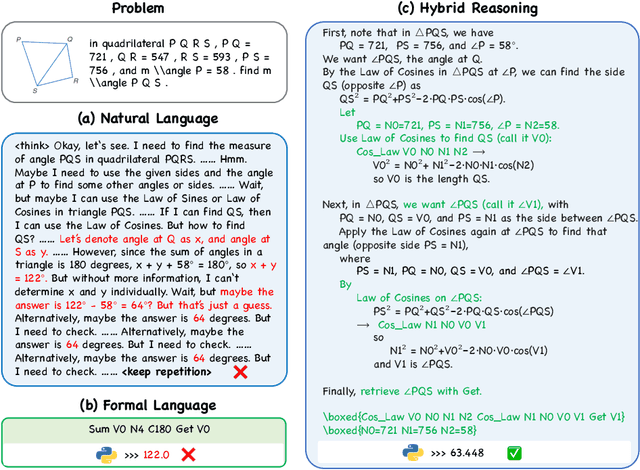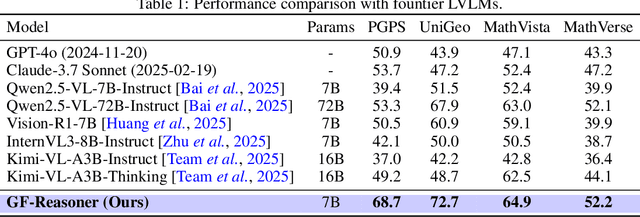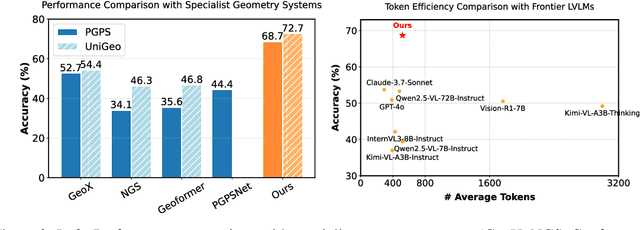Yunwen Li
Bridging Formal Language with Chain-of-Thought Reasoning to Geometry Problem Solving
Aug 12, 2025



Abstract:Large vision language models exhibit notable limitations on Geometry Problem Solving (GPS) because of their unreliable diagram interpretation and pure natural-language reasoning. A recent line of work mitigates this by using symbolic solvers: the model directly generates a formal program that a geometry solver can execute. However, this direct program generation lacks intermediate reasoning, making the decision process opaque and prone to errors. In this work, we explore a new approach that integrates Chain-of-Thought (CoT) with formal language. The model interleaves natural language reasoning with incremental emission of solver-executable code, producing a hybrid reasoning trace in which critical derivations are expressed in formal language. To teach this behavior at scale, we combine (1) supervised fine-tuning on an 11K newly developed synthetic dataset with interleaved natural language reasoning and automatic formalization, and (2) solver-in-the-loop reinforcement learning that jointly optimizes both the CoT narrative and the resulting program through outcome-based rewards. Built on Qwen2.5-VL-7B, our new model, named GF-Reasoner, achieves up to 15% accuracy improvements on standard GPS benchmarks, surpassing both 7B-scale peers and the much larger model Qwen2.5-VL-72B. By exploiting high-order geometric knowledge and offloading symbolic computation to the solver, the generated reasoning traces are noticeably shorter and cleaner. Furthermore, we present a comprehensive analysis of method design choices (e.g., reasoning paradigms, data synthesis, training epochs, etc.), providing actionable insights for future research.
COIG-P: A High-Quality and Large-Scale Chinese Preference Dataset for Alignment with Human Values
Apr 07, 2025Abstract:Aligning large language models (LLMs) with human preferences has achieved remarkable success. However, existing Chinese preference datasets are limited by small scale, narrow domain coverage, and lack of rigorous data validation. Additionally, the reliance on human annotators for instruction and response labeling significantly constrains the scalability of human preference datasets. To address these challenges, we design an LLM-based Chinese preference dataset annotation pipeline with no human intervention. Specifically, we crawled and carefully filtered 92k high-quality Chinese queries and employed 15 mainstream LLMs to generate and score chosen-rejected response pairs. Based on it, we introduce COIG-P (Chinese Open Instruction Generalist - Preference), a high-quality, large-scale Chinese preference dataset, comprises 1,009k Chinese preference pairs spanning 6 diverse domains: Chat, Code, Math, Logic, Novel, and Role. Building upon COIG-P, to reduce the overhead of using LLMs for scoring, we trained a 8B-sized Chinese Reward Model (CRM) and meticulously constructed a Chinese Reward Benchmark (CRBench). Evaluation results based on AlignBench \citep{liu2024alignbenchbenchmarkingchinesealignment} show that that COIG-P significantly outperforms other Chinese preference datasets, and it brings significant performance improvements ranging from 2% to 12% for the Qwen2/2.5 and Infinity-Instruct-3M-0625 model series, respectively. The results on CRBench demonstrate that our CRM has a strong and robust scoring ability. We apply it to filter chosen-rejected response pairs in a test split of COIG-P, and our experiments show that it is comparable to GPT-4o in identifying low-quality samples while maintaining efficiency and cost-effectiveness. Our codes and data are released in https://github.com/multimodal-art-projection/COIG-P.
SuperGPQA: Scaling LLM Evaluation across 285 Graduate Disciplines
Feb 20, 2025Abstract:Large language models (LLMs) have demonstrated remarkable proficiency in mainstream academic disciplines such as mathematics, physics, and computer science. However, human knowledge encompasses over 200 specialized disciplines, far exceeding the scope of existing benchmarks. The capabilities of LLMs in many of these specialized fields-particularly in light industry, agriculture, and service-oriented disciplines-remain inadequately evaluated. To address this gap, we present SuperGPQA, a comprehensive benchmark that evaluates graduate-level knowledge and reasoning capabilities across 285 disciplines. Our benchmark employs a novel Human-LLM collaborative filtering mechanism to eliminate trivial or ambiguous questions through iterative refinement based on both LLM responses and expert feedback. Our experimental results reveal significant room for improvement in the performance of current state-of-the-art LLMs across diverse knowledge domains (e.g., the reasoning-focused model DeepSeek-R1 achieved the highest accuracy of 61.82% on SuperGPQA), highlighting the considerable gap between current model capabilities and artificial general intelligence. Additionally, we present comprehensive insights from our management of a large-scale annotation process, involving over 80 expert annotators and an interactive Human-LLM collaborative system, offering valuable methodological guidance for future research initiatives of comparable scope.
 Add to Chrome
Add to Chrome Add to Firefox
Add to Firefox Add to Edge
Add to Edge